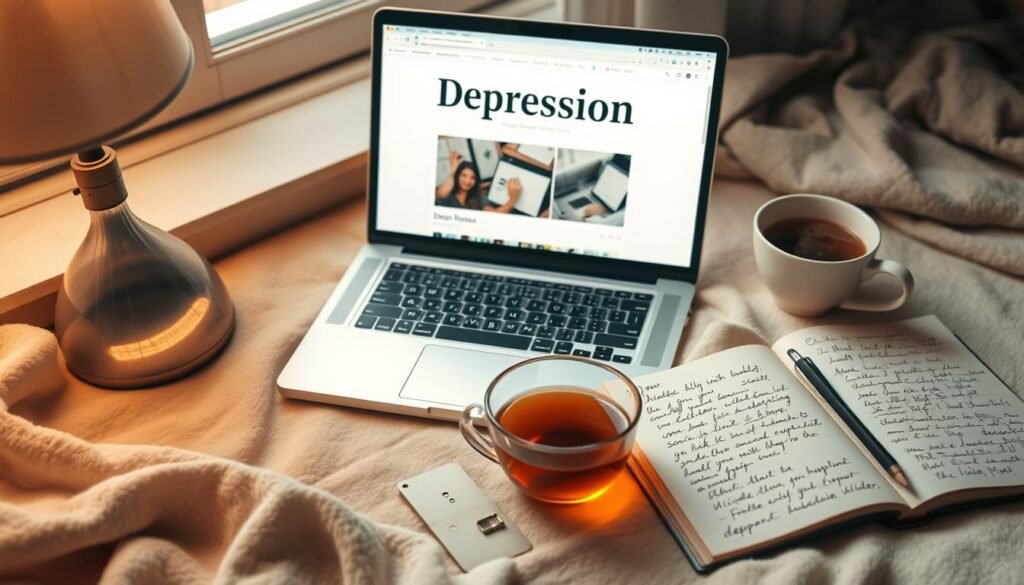About 17.3 million adults in the US have a major depressive episode each year. That’s a lot of people needing help. Online resources for depression are becoming very important. They give access to support, educational materials, and a way to connect with others. They’re great for people who find going to a therapist’s office hard or impossible.
The National Alliance on Mental Illness (NAMI) and the Anxiety and Depression Association of America (ADAA) are two great places to start. They provide lots of information about depression and how to deal with it. On their websites and forums, you can find help that suits your situation. This helps people feel less alone and more understood as they get better.
Key Takeaways
- Over 17 million adults in the U.S. face major depressive episodes annually.
- Online resources provide crucial support and education for those affected by depression.
- Trusted organizations like NAMI and ADAA offer valuable information and resources.
- Depression websites facilitate connections through mental health forums.
- Accessible support is critical in promoting mental wellness.
Understanding Depression and Its Impact
Depression is a complex mental health condition. It affects many people worldwide. The symptoms of depression can be quite different from person to person. It’s important to recognize these symptoms early for effective help and support.
Common Symptoms of Depression
Common symptoms include:
- Persistent sadness or low mood
- Loss of interest in activities once found enjoyable
- Changes in appetite, leading to weight loss or gain
- Difficulties with concentration and decision-making
Many people report feeling these symptoms, as per recent mental health statistics. Unfortunately, lots of them don’t get the help they need. Knowing these facts can help us talk more about mental health issues.
How Depression Affects Daily Life
The impact of depression on daily life is huge. It can make personal relationships tough. People might find it hard to talk to those they care about. Work may suffer too, leading to missed days or less work done. Life’s overall quality can go down, with feelings of hopelessness and fatigue taking over.
It’s vital to link depression symptoms with how they affect daily life. Getting support, like therapy or community help, can make things better. You can get more tips on finding good support here.
| Symptoms | Impact on Daily Life |
|---|---|
| Persistent sadness | Reduced engagement in social activities |
| Loss of interest | Decreased work productivity |
| Changes in appetite | Health complications, such as obesity or malnutrition |
| Difficulties concentrating | Impacts on decision making and task completion |
Online Resources for Depression
Looking into online resources can really help those dealing with depression. These tools are flexible, keep you anonymous, and give easy access to support and information. They make sure help is there whenever it’s needed.
Benefits of Online Support Resources
Online support resources make it easy to get information, therapy, and connect with others. Here are some perks:
- Anonymity: It’s easier for many people to seek help when their identity is protected.
- Flexibility: You can access mental health resources on your own schedule, which is great for busy lives.
- Accessibility: Reliable depression sites are open all the time, so help is always there.
This means you can find a lot of mental health tools online, any time you want.
Examples of Trusted Websites
There are many trusted websites for depression, offering different services. Here are some:
| Website | Services Offered | User Feedback |
|---|---|---|
| BetterHelp | Online therapy with licensed professionals | Highly rated for convenience and accessibility |
| 7 Cups | Peer support and chat services | Praised for community engagement and available resources |
| Talkspace | Video and text therapy sessions | Recognized for effective communication and therapy options |
These sites offer help and also teach users about depression. For more info on mental health services, check out this resource.
Virtual Therapy Options
Virtual therapy has become a popular way to get mental health support. It is also known as teletherapy. It involves therapy sessions over video calls, chats, or phone calls. This method lets people get help from home. They can work with therapists specialized in different areas.
What is Teletherapy?
Teletherapy is a flexible solution for those facing mental health challenges. It uses technology to connect patients with licensed therapists, no matter where they are. It’s especially useful for those who can’t go to in-person sessions. This might be because they have mobility problems, are too busy, or don’t have local options. Teletherapy offers regular help, access to specialized care, and a remote but supportive therapy relationship.
Choosing the Right Virtual Therapy Service
When picking a teletherapy service, think carefully. Here’s what to consider:
- Therapist Qualifications: Seek therapists with the right credentials and experience for your needs.
- Session Costs: Look at prices to make sure they fit your budget. Check if there are subscription or pay-per-session plans.
- Service Ratings: Read reviews and testimonials to see how effective the services are.
Well-known platforms like Amwell and MDLive offer different teletherapy services. They help patients find the right mental health support for them.

| Platform | Cost per Session | Specialties Available |
|---|---|---|
| Amwell | $99 | Depression, Anxiety, PTSD |
| MDLive | $108 | Stress, Depression, Relationship Issues |
Self-Help Apps for Managing Depression
Self-help apps are a great help for those dealing with depression. They offer helpful features and are easy to use. Many apps are highly rated and provide tools and new ways to handle symptoms effectively.
Top Rated Self-Help Apps
Below, find some highly praised self-help apps for coping with depression:
- Moodfit: This app tracks your mood and gives you customized exercises to boost your mental health.
- Worry Watch: Users can track their worries and get insights. This helps tackle anxiety and stress related to depression.
- Daylio: A micro-diary app that lets users note their moods and activities. It’s great for spotting trends over time.
Features to Look for in Self-Help Apps
When choosing self-help apps, here are essential features to consider:
| App Feature | Description | Benefits |
|---|---|---|
| Mood Tracking | Allows users to record how they feel each day. | Helps spot triggers and patterns. |
| Guided Exercises | Includes meditation and cognitive exercises. | Promotes positive thinking. |
| Resource Library | Gives access to mental health articles and videos. | Teaches users about their condition. |
Studies show tech is effective in managing mental health. Using self-help apps daily can lead to better emotional well-being.
Online Support Groups and Communities
Online support groups are key in building community connections for those facing mental health issues. These platforms provide safe places to share stories, learn, and find emotional support. They go beyond talk, helping members understand their emotions and find ways to cope.
Benefits of Joining an Online Support Group
Being part of online support groups can greatly improve your mental health. They offer several benefits:
- Emotional Reassurance: Meeting others with similar issues helps you feel less alone.
- Reducing Isolation: It’s a way to connect and have open talks about mental health.
- Sharing Coping Strategies: You can learn new ways to deal with your symptoms and challenges.
These groups lessen mental health burdens and highlight peer support’s value. Sites like Mental Health America foster dialogue and growth. They turn individual struggles into collective answers.
Finding the Right Community for You
Finding the right online support group is crucial. Here’s how to find the best one for you:
- Understand Your Needs: Know the kind of support you’re looking for.
- Research Different Platforms: Look into various groups that focus on specific mental health areas.
- Evaluate Comfort Levels: Choose groups where you feel welcome and free to talk.
- Check Group Moderation Policies: Make sure the groups are well-moderated for safety and respect.

By considering these points, you can find a community that really speaks to your needs. This can greatly help your journey towards better mental health.
Exploring Depression Blogs for Insights and Stories
Depression blogs give us a personal look into the lives of those struggling with mental health. They share personal stories that highlight the journey of individuals with depression. These insights create comfort and a reminder that nobody is alone.
Notable Depression Blogs to Follow
There are many blogs that offer valuable insights into mental health. Some noteworthy ones include:
- The Mighty: Focuses on chronic illnesses including mental health, featuring diverse voices sharing their stories.
- Art of Depression: Combines creative expression with discussions about depression, allowing readers to explore artistic paths towards healing.
- Just a Little Red: Highlights personal narratives of living with depression, revealing the everyday realities faced by many.
Personal Stories and Their Impact
Personal stories about depression are very important. They make this misunderstood condition more human. These stories give comfort, fight stigma, and encourage talking about mental health.
Through sharing, readers find validation and insights that help their own paths. This builds a supportive community based on empathy and understanding.

| Blog Name | Focus Area | Unique Feature |
|---|---|---|
| The Mighty | Chronic illnesses & Mental Health | Diverse community of storytellers |
| Art of Depression | Creative expression | Utilizes art as a healing tool |
| Just a Little Red | Personal experiences with depression | Focus on daily realities and struggles |
E-Counseling Platforms for Professional Help
People looking for help with mental health issues have many options through e-counseling. These platforms are easy to use and reach, making therapy simpler for lots of folks. It helps to know about the various online therapy types you can choose from.
Types of E-Counseling Services Available
Different e-counseling services meet different needs. Some common types include:
- Chat counseling, for real-time text conversations.
- Video sessions, which are like meeting a therapist in person.
- Text messaging support, for advice when you need it, even if not in real-time.
Platforms such as BetterHelp, Talkspace, and Regain offer these services. They have something for everyone, no matter what you prefer.
How to Select a Trusted E-Counseling Platform
When picking an e-counseling service, consider a few things. Look at:
- The therapist’s credentials to make sure they are qualified.
- User reviews to learn from other people’s experiences.
- Pricing structures to ensure it’s affordable yet high-quality.
Looking at these factors helps you choose wisely from the many online counseling options. For more info, check out resources like this guide.
Digital Mental Health Tools for Everyday Support
Nowadays, digital tools for mental health are a big help for many. Apps like Woebot and Moodscope let people track their feelings. This helps them see what affects their mood. These apps offer coping strategies that meet individual needs.
Popular Digital Tools for Mood Tracking
Many digital tools are out there, but mood tracking apps stand out. Woebot uses AI for meaningful talks that boost self-reflection. Moodscope lets users rate their mood daily and track their progress. Using these apps daily helps people understand their emotional habits. This is key for taking care of your mental health before issues arise.
Integrating Mental Health Tools into Daily Life
For mood tracking apps to work best, try using them at certain times, like in the morning or before bed. The aim is to build steady habits that support your mental health every day. By making these apps a routine, you can take an active role in your mental health journey. This leads to better awareness and well-being.